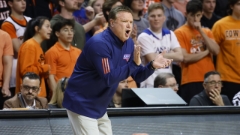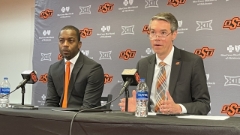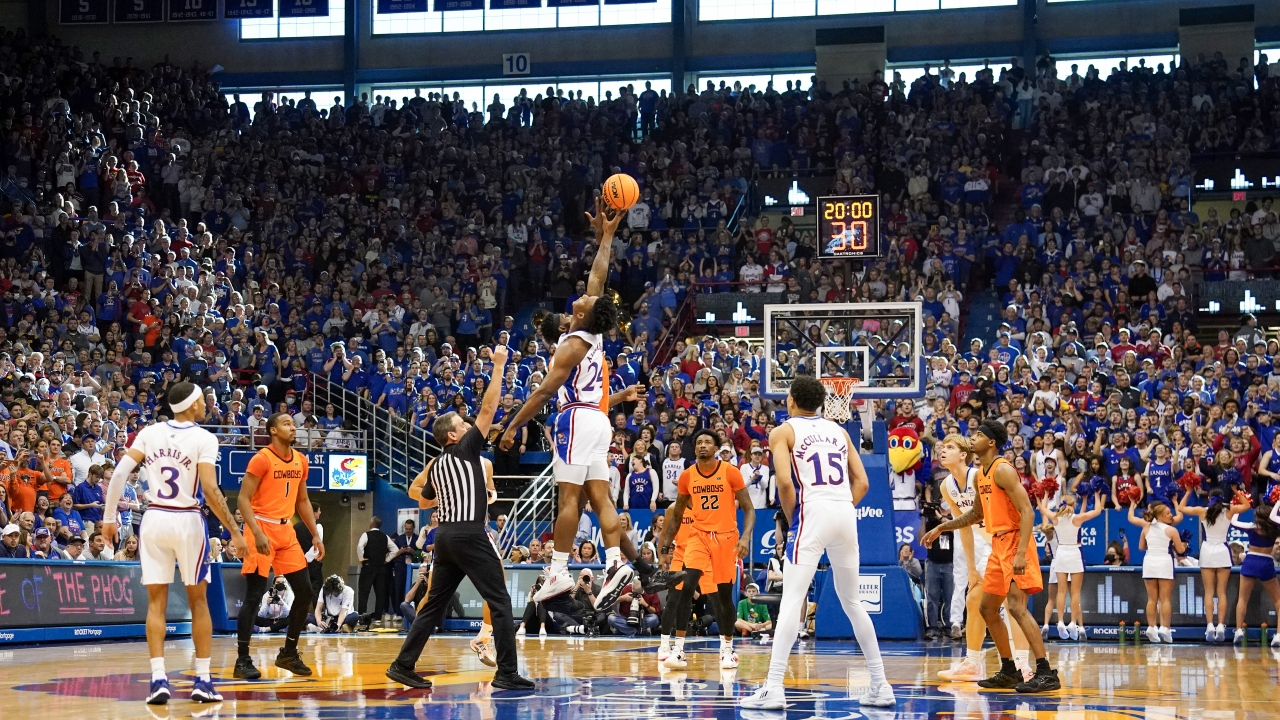STILLWATER – The decison and punsihment is out and Oklahoma State, which sat out the 2022 postseason, both the Big 12 Postseason Tournament and the NCAAand/or NIT Tournament for a violation initially deemed Level II, now sees the “blue blood” University of Kansas program, which had initially five level one violations as interpreted from actual FBI wiretaps and investigation get off like the Jayhawks were caught jay walking.
The NCAA’s Independent Accountability Review Process (IARP), a new form of NCAA ajudication formed to speed up the process, actually took longer than normal with the KU decison. Their decision led to a downgrade in the severity of the five Level I allegations against the program, down to Level II. The IARP panel gave Kansas a three-year probation, with no effect on the program’s postseason status.
On the surface it looks like Kansas operated a criminal ring of illegalities in their recruiting and got a slap on the wrist (or wing). Oklahoma State made one payment to a current player, not a recruit, that was completely paid back and the player sat out a suspension. The Cowboys got the single season version of a death sentence.

Alonzo Adams-USA TODAY Sports
Bill Self, no further penalties.
Two Kansas coaches were named in the investigation including head coach Bill Self, who was initially charged with a Level I violation and was suspended for four games last season. Now the charge for the Hall of Fame coach was reduced to a Level III violation and no additional penalties. Assistant coach Kurtis Townsend, who was suspended four games last year as well, had his charges reduced from Level I to a Level II and a Level III violation, with no additional penalties. Neither coach faces a show-cause order, which could have been applicable for Level I violations.

Zachary Lancaster - Pokes Report
Boynton and Weiberg meeting with the media after the NCAA released final penalties for OSU basketball.
We quickly checked with Oklahoma State University and in particular with athletics director Chad Weiberg and head basketball coach Mike Boynton for a reaction to the Kansas decision and penalties with regard to direct comparison with the punishment that Oklahoma State received in the fall of 2020 and th ultimate final decision in November of 2021 leading to the 2021-22 Oklahoma State team knowing they could not participate in postseason.
Weiberg responded fairly quickly with an “off the record” opinion, while Boynton did not respond. A member of the Oklahoma State University atheltic media relations staff, basketball contact Bryan Holmgren said there were ongoing discussions on whether there would be a response and how that would be crafted.
Later that afternoon there was an official response for Oklahoma State University athletics.
They responded that day back in Nov. of 2021, very emphatically.
“This was about trying to save face for something that was uncovered not because of their doing,” Cowboy basketball coach Mike Boynton said of the FBI’s investigation that discovered improprieties involving several other college basketball assistants like then OSU assistant Lamont Evans. “And now our cooperation has made it worse for guys like Isaac Likekele who was nowhere near Stillwater when this was happening.”
Evans was fired immediately after the allegations were made and charges were filed.
“To use this flawed and inconsistent process to take away the opportunity for postseason and the NCAA Tournament from student-athletes that had nothing whatsoever to do with this case,” Weiberg said, “proves to me that the national office has chosen to weaponize the NCAA Tournament against the very membership that has turned it into the lifeblood of the NCAA.”
Weiberg also openly questioned whether schools under NCAA investigation should cooperate with the process, which Oklahoma State completely did in this process.
The Kansas case is the final one resulting from the 2017 FBI investigation into corruption in college basketball. That process resulted in major violations in no fewer than eight programs including Louisville, Arizona, LSU, and others. It also is the final act by the IARP as the process has been considered too cumbersom and inefficient. The process used outside sources to serve as judge and jury on NCAA violations. My contention is it would work if not for the idiocy of the rules and the organization in cases just like this.





